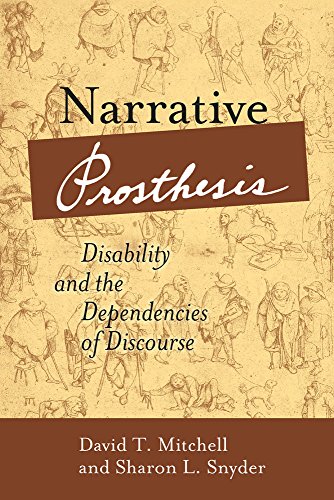Narrative Prosthesis
Disability and the Dependencies of Discourse (Corporealities Discourses Of Disability)
David T. Mitchell; Sharon L. Snyder
BOOK REVIEW

In the profound exploration of narrative and disability, Narrative Prosthesis: Disability and the Dependencies of Discourse emerges as a pivotal commentary that demands your urgent reconsideration of the masterful interplay between literature and societal perceptions of disability. Authored by the insightful minds of David T. Mitchell and Sharon L. Snyder, this work is not just an academic treatise; it is a chilling confrontation with the narrative biases that persist in our society.
Marrying the nuances of literary theory with real-world implications, Mitchell and Snyder challenge you to dissect the way disability shapes and transforms storytelling. How often do you encounter disability in literature? More importantly, how is it represented? The authors argue-provocatively-that disability serves not merely as a subject but as an essential narrative prosthesis, an apparatus that fills the gaps in discourse where understanding falters. This narrative function, they assert, is dependent on societal stereotypes and assumptions, unmasking how literature mirrors and reinforces cultural mythologies surrounding disability.
This text takes you into the depths of discourse analysis while resonating with an urgency that is hard to ignore. Have we, as a culture, relegated disability to mere trope status, using it to evoke sympathy or moral purity? The authors' arguments resonate like a bell tolling for awareness, resonating with readers who harbor a curiosity for truth. Every line is an invitation to challenge the status quo and explore the uncharted territories of depictions of disability, beckoning you to engage with its implications critically.
Readers have grappled passionately with the content, sparking heated debates and sharing divergent perspectives. Some hail the authors as pioneers in disability studies, artfully articulating a profound connection between narrative structures and societal norms. Others voice concerns regarding the density of the academic language, suggesting it may alienate laypersons who wish to engage with the themes. Still, the consensus is clear: Narrative Prosthesis invokes a deeply personal reckoning with the narratives we consume and produce.
The historical context of the publication further enriches its urgency. Released in 2001, this work came at a time when disability rights were gaining momentum in public consciousness yet were still fraught with misrepresentation. Mitchell and Snyder's insights resonate even today, aligning with contemporary movements advocating for authentic representation of marginalized voices. Their arguments reflect the long-standing battle against ableism and encourage you to question how literature can serve as both a battleground and a sanctuary for those narratives that are often overlooked or misrepresented.
The exploration of narrative prosthesis ignites a fire in readers, compelling them to not only digest their findings but also to act upon them. This isn't merely a call to understand; it is a rallying cry for empathy and solidarity with those whose experiences are too frequently relegated to the background. If you traverse the pages armed with a spirit of reflection, you may find your own perspectives challenged and reshaped.
In an era where representation matters more than ever, Narrative Prosthesis stands as a monumental reminder of the power of discourse to either uplift or suppress. What stories do you engage with, and what are they omitting? The answers may be more profound than you anticipate, pushing you toward a broader understanding of what it means to be human, to be whole, and to belong in narratives as complex and varied as our realities.
Join the conversation. Equip yourself with the knowledge that Mitchell and Snyder so passionately present. When you engage with this work, you're not just reading; you're participating in a movement that aims to reshape the landscape of literary representation-one narrative at a time. 🌟
📖 Narrative Prosthesis: Disability and the Dependencies of Discourse (Corporealities: Discourses Of Disability)
✍ by David T. Mitchell; Sharon L. Snyder
🧾 229 pages
2001
#narrative #prosthesis #disability #dependencies #discourse #corporealities #discourses #disability #david #mitchell #DavidTMitchell #sharon #snyder #SharonLSnyder